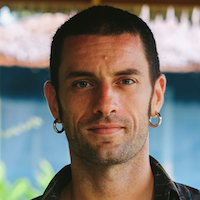Let’s face it: break-ups are one of the most transcendental events in our emotional lives.
Opinions on break-ups can be wildly diverse. Some people say that break-ups just suck; others that they can be a beautiful opportunity for personal evolution. As for me, I often try to look at break-ups from another standpoint: that of the planet as a system.
What does it mean for the world and the humans that inhabit it, when two people break up and a relationship comes to an end?
First, let’s consider one of the basic assumptions of all kinds of spirituality or conscious self-development: we humans are all interconnected and we are actually part of one big organism.
Well, that same holistic perspective can also be applied to love and relationships. This means that, when we break up with someone, it affects everyone around us in one way or another.
And vice-versa—we are affected by everyone else’s emotional connections (or dis-connections).
Keeping that in mind, let’s imagine a world in which couples never break up. People find a partner very young and stay together for the rest of their lives. Let’s make this imaginary world as nice as possible by assuming that everyone enjoys happy and harmonious relationships and no-one even considers the idea of splitting up.
Wouldn’t this be a wonderfully simple, orderly world—at least as far as love relationships are concerned? Most likely, yes.
At the same time, this fantasy world would be quite static. How much transformation happens because people break up, reshuffle and couple up again?
Well, that transformation would simply not happen in our imaginary realm.
Also, in such a perfectly ordered world, no one would ever become “available” for a new relationship unless his or her previous partner dies, because there is no other reason that could bring a relationship to an end.
A bit of an extreme condition, isn’t it? This shows one often overlooked side effect of break-ups: they re-introduce two potentially available individuals into the “love marketplace.” This could end up benefiting someone else in the long run—someone who is looking for a partner.
So maybe our chaotic, unstable and insufferably dynamic relationship life does have some advantages to it, on a bigger scale.
Yes, breaking up is painful. It shatters our emotional world and it threatens our stability. And, undeniably, most of us want at least a minimum degree of stability in our love life. But stability has a flipside: immobility.
A break-up can introduce dynamism and represent a moment of change in which the energy starts flowing in different ways than it had done so far. It may be good for the world, because it counterbalances stability and immobility.
If we zoom out from the specific context of relationships, it’s easy to realize that, generally speaking, our mind likes stability (and immobility) in every field of life. Our mind loves things to be predictable and it pretty much dislikes change. Sure, most of us can enjoy a certain degree of variety in the most superficial aspects of our life—like changing clothes daily. But whenever a big shift occurs—we need to move to another country, or an illness forces us to restructure our life, or death knocks at our door—a part of us resists it.
Yet, we all know that change needs to happen in our lives, whether we like it or not.
The physical body changes, relationships come to an end (or, some would say, they come to a radical transformation—relationships never really end), our financial situation fluctuates and so on. Change comes to us when we least expect it. Life stubbornly refuses to conform to the plans of our minds.
When faced with an incoming transformation, we can either choose to resist it or gracefully flow with it, even if it seems unpleasant at first. Learning how to flow with life and how to “surf” on the waves of change is one of the key factors in living a harmonious, happy existence. In yoga, this is called santosha—the capacity to be happy and content with our life, whatever the external conditions might be.
In relationships, gracefully flowing with change often means being ready to accept a break-up.
We often associate “success” in relationship with length. Hundreds of books, movies and songs have been written on how to make our relationships last. Indeed, a long lasting love relationship can be a beautiful thing. But “long lasting” does not always mean “good.”
We all know examples of couples for whom separation could be (or has been) the key to happiness and growth. And some of us have experienced incredibly deep and fulfilling relationships that have lasted only days, or hours. In reality, nothing lasts forever and the ideas of “long relationship” and “short relationship” are as personal and relative as anything else.
Probably, from the standpoint of the Universe, whether we remain with our current boyfriend or girlfriend for 10 days or 10 years does not make much of a difference. Of course it does for us—and for him or her—but sometimes we obsess over the duration of a relationship more than is in any way reasonable.
Zooming out and looking at the bigger picture can be helpful in understanding that, even after a painful break-up, life goes on—perhaps in an unexpected and beautiful new direction.
There is nothing wrong with wanting a relationship to last and doing all we can to avoid a break-up—within the limits of respect and integrity, of course. But once a break up happens, it’s up to us whether we experience it as a disaster, a failure, and a catastrophic event—or as an opportunity for change, evolution and growth.
Relephant:
The Beauty in Breakups: What we Learn from Embracing the End.
Author: Raffaello Manacorda
Assistant Editor: Hilda Carroll/Editor: Catherine Monkman
Photo: jinterwas/Flickr












Read 0 comments and reply